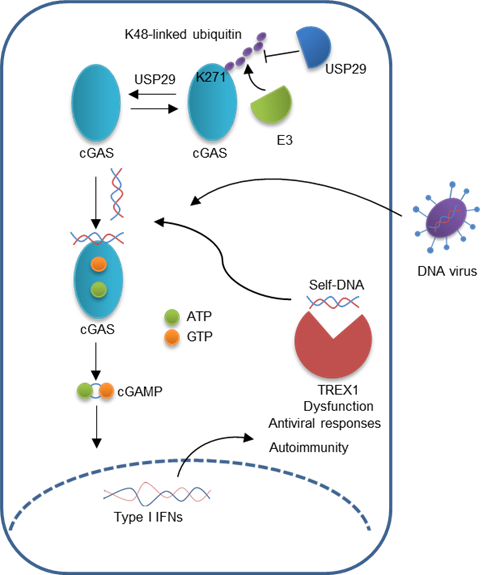On May 26, 2020, Prof. Bo Zhong’s group published an article entitled "USP29 maintains the stability of cGAS and promotes cellular antiviral responses and autoimmunity" on Cell Research (https://www.nature.com/articles/s41422-020-0341-6). In this study, they found a critical role of USP29 in the innate immune responses against DNA viruses and autoimmune diseases by regulating cyclic GMP-AMP synthase (cGAS).
cGAS is an essential sensor of cytosolic DNA and critically mediates innate immune responses and autoimmunity. The activity and stability of cGAS must be tightly controlled to elicit protective immune responses and avoid harmful immune pathology and modulating the activity and stability of cGAS would provide potential strategies for treating viral or autoimmune diseases. Various posttranslational modifications have been reported to control the activity and stability of cGAS, such as ubiquitination, sumoylation and phosphorylation. However, the deubiquitination of cGAS is not fully understood.
In this study, the authors have found that ubiquitin-specific protease 29 (USP29) deubiquitinates and stabilizes cGAS and promotes cellular antiviral responses and autoimmunity. Knockdown or knockout of USP29 severely impairs Herpes simplex virus 1 (HSV-1)- or cytosolic DNA-induced expression of type I interferons (IFNs) and proinflammatory cytokines. Consistently, the Usp29m/m mice produce decreased type I IFNs and proinflammatory cytokines after HSV-1 infection and are hypersensitive to HSV-1 infection compared to the wild-type littermates. In addition, genetic ablation of USP29 in Trex1−/− mice eliminated the detectable pathological and molecular autoimmune phenotypes. Mechanistically, USP29 constitutively interacts with cGAS, deconjugates K48-linked polyubiquitin chains from cGAS and stabilizes cGAS in uninfected cells or after HSV-1 infection. Reconstitution of cGAS into Usp29−/− cells fully rescues type I IFN induction and cellular antiviral responses after HSV-1 infection. Thus, their findings reveal a critical role of USP29 in the innate antiviral responses against DNA viruses and autoimmune diseases and provide insight into the regulation of cGAS.
The research was supported by projects including National Key Research and Development Program of China, Natural Science Foundation of China, Natural Science Foundation of Hubei Province, and Medical Science Advancement Program (Basic Medical Sciences) of Wuhan University. The corresponding author is Dr. Bo Zhong who is a joint professor at Medical Research Institute and at College of Life Sciences, Frontier Science Center for Immunology and Metabolism, Wuhan University. The first author is Mr. Qiang Zhang, who is in his fifth-year of Ph.D. study from College of Life Sciences, Wuhan University.

